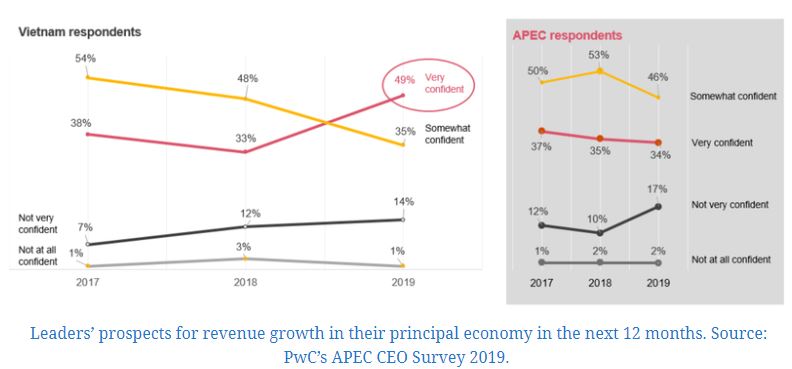Vietnam remains top destination for cross-border investment: Survey
The Hanoitimes – In addition to being positive on cross-border investment, 62% of respondents in Vietnam expect to increase their domestic investment in the next 12 months, higher than other economies such as China, Japan and Singapore.
Among Asia-Pacific Economic Cooperation (APEC) business leaders with a footprint in Vietnam, 44% plan to increase investment in the country over the next year, making the country once again the most attractive destination for foreign investment.
The findings are extracted from PwC’s latest survey “Doing business across borders in Asia Pacific 2019-2020”. Survey results include responses of over 1,000 business leaders from 21 APEC economies who collectively account for half of world trade and more than half of the world’s GDP.
In addition to being positive on cross-border investment, 62% of the respondents in Vietnam expect to increase their domestic investment in the next 12 months, higher than other economies such as China, Japan and Singapore.
Moreover, business leaders in Vietnam are more optimistic about prospects for their own organizations, with 49% “very confident” of revenue growth in the year ahead, as compared to 34% of APEC business leaders.
“Amidst anticipated pressure from increased challenges to cross border activities, Vietnam is holding on to its momentum for continuous growth with business leaders’ confidence boosted with uplifted optimism, and the economy continues to attract investments not only from overseas but also from its expanding domestic force,” said Dinh Thi Quynh Van, PwC Vietnam’s general director.
Finding new pathways through technological and workforce changes
The responses from business leaders in Vietnam showed noticeable prioritization on advanced technology and equipping the workforce with the necessary skills to stay competitive in the market, which are both in line with global trends.
Approximately 80% of business leaders in Vietnam see technology advancement as a strategic priority. Thus, it is encouraging that a majority plan to increase budget allocation, especially in integrating data and systems, as well as accelerating digital skills development in the next two years.
However, as automation and AI advances in the workforce, this year’s survey highlights that employee roles are also being redefined. 23% of business leaders in Vietnam struggle to recruit people with appropriate skills to accommodate automation. And only 5% of Vietnamese leaders, as compared to 12% of total APEC businesses, say with automation, they are creating more jobs with the right talent fit.
Strategic stewardship of automation grows trust
While 80% of business leaders surveyed in Vietnam show that adoption of advanced technology has improved trust among their customers, only 49% believe there is improved public trust. In addressing the areas that need additional regulation to enhance the public trust, both Vietnamese and APEC leaders acknowledge ethical use of cybersecurity, AI and data privacy as top concerns.
In order to innovate and grow in the digital economy, business leaders want oversight, guidance and predictability.
“Business leaders don’t often call for more regulation, but companies are acutely aware of the risk that disconnected or ineffective policies in areas such as AI, cyber security and privacy protection can have on their plans for investment and the trust that consumers have in business,” added Bob Moritz, PwC’s global chairman.
Source: http://hanoitimes.vn/vietnam-remains-top-destination-for-cross-border-investment-despite-rising-constraints-300512.html


 English
English




